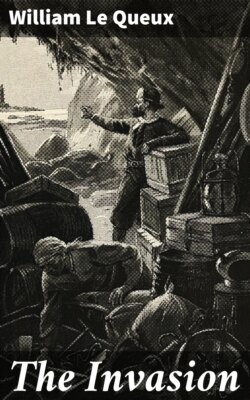Читать книгу The Invasion - William Le Queux - Страница 14
На сайте Литреса книга снята с продажи.
WILL BE PUNISHED BY DEATH.
ОглавлениеTable of Contents
IN EACH CASE the officer presiding at the Council of War will be charged with the trial, and pronounce judgment. Councils of War may not pronounce ANY OTHER CONDEMNATION SAVE THAT OF DEATH.
THE JUDGMENT WILL BE IMMEDIATELY EXECUTED.
(3) TOWNS OR VILLAGES in the territory in which the contravention takes place will be compelled to pay indemnity equal to one year's revenue.
(4) THE INHABITANTS MUST FURNISH necessaries for the German troops daily as follows:—
| 1 lb. 10 oz. bread. | 1 oz. tea. | 1½ pints beer, or 1 wine- |
| 13 oz. meat. | 1½ oz. tobacco or 5 cigars. | glassful of brandy or |
| 3 lb. potatoes. | ½ pint wine. | whisky. |
| The ration for each horse:— | ||
| 13 lb. oats. | 3 lb. 6 oz. hay. | 3 lb. 6 oz. straw. |
(ALL PERSONS WHO PREFER to pay an indemnity in money may do so at the rate of 2s. per day per man.)
(5) COMMANDERS OF DETACHED corps have the right to requisition all that they consider necessary for the well-being of their men, and will deliver to the inhabitants official receipts for goods so supplied.
WE HOPE IN CONSEQUENCE that the inhabitants of Great Britain will make no difficulty in furnishing all that may be considered necessary.
(6) AS REGARDS the individual transactions between the troops and the inhabitants, we give notice that one German mark shall be considered the equivalent to one English shilling.
The General Commanding the Ninth German Army Corps,
VON KRONHELM.
Beccles, September the Third, 1910.
THE ENEMY'S FAMOUS PROCLAMATION.
The public, however, little dreamed of the hopeless confusion in the War Office, in the various regimental depôts throughout the country, at headquarters everywhere, and in every barracks in the kingdom. The armed forces of England were passing from a peace to a war footing; but the mobilisation of the various units—namely, its completion in men, horses, and material—was utterly impossible in the face of the extraordinary regulations which, kept a strict secret by the Council of Defence until this moment, revealed a hopeless state of things.
The disorder was frightful. Not a regiment was found fully equipped and ready to march. There was a dearth of officers, equipment, horses, provisions—of, indeed, everything. Men had guns without ammunition; cavalry and artillery were without horses; engineers only half equipped; volunteers with no transport whatever; balloon sections without balloons, and searchlight units vainly trying to obtain the necessary instruments.
Horses were being requisitioned everywhere. The few horses that, in the age of motor-cars, now remained on the roads in London were quickly taken for draught, and all horses fit to ride were commandeered for the cavalry.
During the turmoil daring German spies were actively at work south of London. The Southampton line of the London and South-Western Railway was destroyed—with explosives placed by unknown hands—by the bridge over the Wey, near Weybridge, being blown up; and again that over the Mole, between Walton and Esher, while the Reading line was cut by the great bridge over the Thames at Staines being destroyed. The line, too, between Guildford and Waterloo, was also rendered impassable by the wreck of the midnight train, which was blown up half-way between Wansborough and Guildford, while in several other places nearer London bridges were rendered unstable by dynamite, the favourite method apparently being to blow the crown out of an arch.
The well-laid plans of the enemy were thus quickly revealed. Among the thousands of Germans working in London, the hundred or so spies, all trusted soldiers, had passed unnoticed but, working in unison, each little group of two or three had been allotted its task, and had previously thoroughly reconnoitred the position and studied the most rapid or effective means.
The railways to the east and north-east coasts all reported wholesale damage done on Sunday night by the advance agents of the enemy, and now this was continued on the night of Monday in the south, the objective being to hinder troops from moving north from Aldershot. This was, indeed, effectual, for only by a long détour could the troops be moved to the northern defences of London, and while many were on Tuesday entrained, others were conveyed to London by the motor omnibuses sent down for that purpose.
Everywhere through London and its vicinity, as well as Manchester, Birmingham, Sheffield, Coventry, Leeds, and Liverpool, motor-cars and motor-omnibuses from dealers and private owners were being requisitioned by the military authorities, for they would, it was believed, replace cavalry to a very large extent.
Wild and extraordinary reports were circulated regarding the disasters in the north. Hull, Newcastle, Gateshead, and Tynemouth had, it was believed, been bombarded and sacked. The shipping in the Tyne was burning, and the Elswick works were held by the enemy. Details were, however, very vague, as the Germans were taking every precaution to prevent information reaching London.
